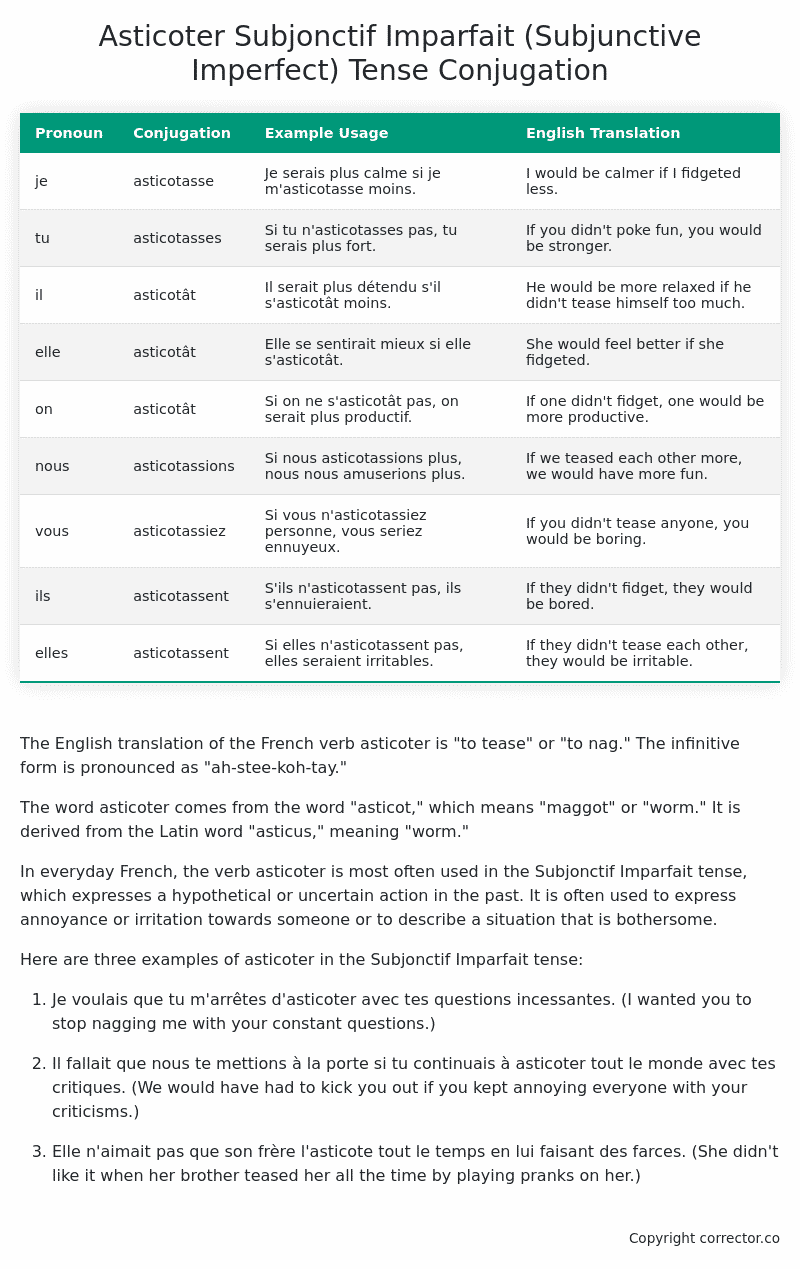Subjonctif Imparfait (Subjunctive Imperfect) Tense Conjugation of the French Verb asticoter
Introduction to the verb asticoter
The English translation of the French verb asticoter is “to tease” or “to nag.” The infinitive form is pronounced as “ah-stee-koh-tay.”
The word asticoter comes from the word “asticot,” which means “maggot” or “worm.” It is derived from the Latin word “asticus,” meaning “worm.”
In everyday French, the verb asticoter is most often used in the Subjonctif Imparfait tense, which expresses a hypothetical or uncertain action in the past. It is often used to express annoyance or irritation towards someone or to describe a situation that is bothersome.
Here are three examples of asticoter in the Subjonctif Imparfait tense:
-
Je voulais que tu m’arrêtes d’asticoter avec tes questions incessantes. (I wanted you to stop nagging me with your constant questions.)
-
Il fallait que nous te mettions à la porte si tu continuais à asticoter tout le monde avec tes critiques. (We would have had to kick you out if you kept annoying everyone with your criticisms.)
-
Elle n’aimait pas que son frère l’asticote tout le temps en lui faisant des farces. (She didn’t like it when her brother teased her all the time by playing pranks on her.)
Table of the Subjonctif Imparfait (Subjunctive Imperfect) Tense Conjugation of asticoter
| Pronoun | Conjugation | Example Usage | English Translation |
|---|---|---|---|
| je | asticotasse | Je serais plus calme si je m’asticotasse moins. | I would be calmer if I fidgeted less. |
| tu | asticotasses | Si tu n’asticotasses pas, tu serais plus fort. | If you didn’t poke fun, you would be stronger. |
| il | asticotât | Il serait plus détendu s’il s’asticotât moins. | He would be more relaxed if he didn’t tease himself too much. |
| elle | asticotât | Elle se sentirait mieux si elle s’asticotât. | She would feel better if she fidgeted. |
| on | asticotât | Si on ne s’asticotât pas, on serait plus productif. | If one didn’t fidget, one would be more productive. |
| nous | asticotassions | Si nous asticotassions plus, nous nous amuserions plus. | If we teased each other more, we would have more fun. |
| vous | asticotassiez | Si vous n’asticotassiez personne, vous seriez ennuyeux. | If you didn’t tease anyone, you would be boring. |
| ils | asticotassent | S’ils n’asticotassent pas, ils s’ennuieraient. | If they didn’t fidget, they would be bored. |
| elles | asticotassent | Si elles n’asticotassent pas, elles seraient irritables. | If they didn’t tease each other, they would be irritable. |
Other Conjugations for Asticoter.
Le Present (Present Tense) Conjugation of the French Verb asticoter
Imparfait (Imperfect) Tense Conjugation of the French Verb asticoter
Passé Simple (Simple Past) Tense Conjugation of the French Verb asticoter
Passé Composé (Present Perfect) Tense Conjugation of the French Verb asticoter
Futur Simple (Simple Future) Tense Conjugation of the French Verb asticoter
Futur Proche (Near Future) Tense Conjugation of the French Verb asticoter
Plus-que-parfait (Pluperfect) Tense Conjugation of the French Verb asticoter
Passé Antérieur (Past Anterior) Tense Conjugation of the French Verb asticoter
Futur Antérieur (Future Anterior) Tense Conjugation of the French Verb asticoter
Subjonctif Présent (Subjunctive Present) Tense Conjugation of the French Verb asticoter
Subjonctif Passé (Subjunctive Past) Tense Conjugation of the French Verb asticoter
Subjonctif Imparfait (Subjunctive Imperfect) Tense Conjugation of the French Verb asticoter (this article)
Subjonctif Plus-que-parfait (Subjunctive Pluperfect) Tense Conjugation of the French Verb asticoter
Conditionnel Présent (Conditional Present) Tense Conjugation of the French Verb asticoter
Conditionnel Passé (Conditional Past) Tense Conjugation of the French Verb asticoter
L’impératif Présent (Imperative Present) Tense Conjugation of the French Verb asticoter
L’infinitif Présent (Infinitive Present) Tense Conjugation of the French Verb asticoter
Struggling with French verbs or the language in general? Why not use our free French Grammar Checker – no registration required!
Get a FREE Download Study Sheet of this Conjugation 🔥
Simply right click the image below, click “save image” and get your free reference for the asticoter Subjonctif Imparfait tense conjugation!

Asticoter – About the French Subjonctif Imparfait (Subjunctive Imperfect) Tense
Formation
Common Everyday Usage Patterns
Interactions with Other Tenses
Subjonctif Présent
Indicatif Passé Composé
Conditional
Conditional Perfect
Summary
I hope you enjoyed this article on the verb asticoter. Still in a learning mood? Check out another TOTALLY random French verb conjugation!


